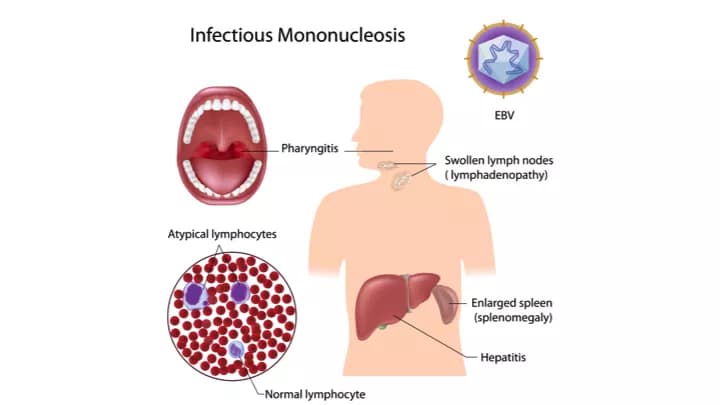What are the other Names for this Test? (Equivalent Terms)
- EA-D IgG Abs Blood Test
- EBV Antibodies Blood Test
- Heterophile Antibodies Blood Test
What is Epstein-Barr Virus (EBV) Antibodies Blood Test? (Background Information)
- The Epstein-Barr virus (EBV) is a member of the herpes virus family (EBV is also known as human herpes virus 4). It is one of the most common pathogens in the world
- The Epstein-Barr virus (EBV) causes infectious mononucleosis, or mono. Teens are especially susceptible to this infection. EBV can also cause various cancers, immune disorders, and mild fever-like symptoms
- Mono is transferred through body fluids. It is most commonly spread through saliva. The transmission path may include kissing and sharing of utensils, towels, etc.
- EBV causes serious symptoms only in susceptible individuals. These include individuals with lowered or underdeveloped immune systems such as the elderly, the young, those undergoing chemotherapy, and those with HIV infection
- Individuals with healthy immune systems can usually fight and control EBV infection. In cases of serious illness, however, drugs called viral polymerase inhibitors may be used
- EBV goes into hibernation after it has completed the “active” part of its infection, characterized by symptoms. The virus infiltrates the DNA of cells. It then lies dormant and can emerge during times of stress or immune system suppression
- Specific antibodies are created by the immune system upon exposure to EBV. Antibodies are proteins that recognize foreign bodies, such as EBV, and help rid them from the body. The targets they recognize are called antigens
- The presence of EBV-specific IgM antibodies indicates recent or current exposure; EBV-specific IgG antibodies indicates a past exposure
The Epstein-Barr Virus (EBV) Antibodies Blood Test is a test to assess the levels of EBV-specific antibodies in blood. It is used to diagnose infection with EBV. The types of antibodies tested include:
- Viral capsid antigen (VCA)-IgM: It peaks several days after exposure to 2 weeks after exposure
- VCA-IgG: It peaks between 2-4 weeks of exposure, then remains at low levels for the rest of the individual’s life
- Early antigen (EA-D): It peaks during the active phase of infection and remains at low levels for several years in 20% of the individuals
- Epstein-Barr nuclear antigen (EBNA): It peaks 2-4 months after exposure and remains at low levels for the rest of the individual’s life
What are the Clinical Indications for performing the Epstein-Barr Virus (EBV) Antibodies Blood Test?
Following are the clinical indications for performing the Epstein-Barr Virus Antibodies Blood Test:
- Headache
- Swollen lymph nodes
- Enlarged spleen
- Enlarged liver
- Abdominal pain
- Fatigue
- Rash
How is the Specimen Collected for Epstein-Barr Virus (EBV) Antibodies Blood Test?
Following is the specimen collection process for Epstein-Barr Virus (EBV) Antibodies Blood Test:
Sample required: Blood
Process of obtaining blood sample in adults:
- A band is wrapped around the arm, 3-4 inches above the collection site (superficial vein that lies within the elbow pit)
- The site is cleaned with 70% alcohol in an outward spiral, away from the zone of needle insertion
- The needle cap is removed and is held in line with the vein, pulling the skin tight
- With a small and quick thrust, the vein is penetrated using the needle
- The required amount of blood sample is collected, by pulling the plunger of the syringe out slowly
- The wrap band is removed, gauze is placed on the collection site, and the needle is removed
- The blood is immediately transferred into the blood container, which has the appropriate preservative/clot activator/anti-coagulant
- The syringe and the needle are disposed into the appropriate “sharp container” for safe and hygienic disposal
- Preparation required: No special preparation is needed prior to the test.
What is the Significance of the Epstein-Barr Virus (EBV) Antibodies Blood Test Result?
The significance of the Epstein-Barr Virus (EBV) Antibodies Blood Test result is explained:
- A positive blood test may indicate an infection with EBV and probable mononucleosis
- A negative blood test may indicate that:
- Not enough time has passed to allow for the production of detectable levels of anti-EBV antibodies
- Infection by a similar virus
- The individual is incapable of producing anti-EBV antibodies and may be too young
The laboratory test results are NOT to be interpreted as results of a "stand-alone" test. The test results have to be interpreted after correlating with suitable clinical findings and additional supplemental tests/information. Your healthcare providers will explain the meaning of your tests results, based on the overall clinical scenario.
Additional and Relevant Useful Information:
- Infectious mononucleosis is a self-limiting disease. In other words, it resolves without the need for significant medical intervention. However, symptoms can be alleviated through rest, consumption of fluids, and proper medications
- EBV is a very common pathogen. Chances are 50% that a typical American will be infected by EBV, by the time he/she is 5 years old; 90% that he/she will be infected by the age of 40
Certain medications that you may be currently taking may influence the outcome of the test. Hence, it is important to inform your healthcare provider, the complete list of medications (including any herbal supplements) you are currently taking. This will help the healthcare provider interpret your test results more accurately and avoid unnecessary chances of a misdiagnosis.
Please visit our Laboratory Procedures Center for more physician-approved health information:
http://www.dovemed.com/common-procedures/procedures-laboratory/
Related Articles
Test Your Knowledge
Asked by users
Related Centers
Related Specialties
Related Physicians
Related Procedures
Related Resources
Join DoveHubs
and connect with fellow professionals


0 Comments
Please log in to post a comment.